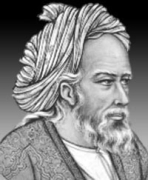| Location: Sydney (AUS) | Sunrise: 06:18 | Sunset: 19:59 | GMT +11 |
| Home
| Moon
| Monitor
| News
| About Me
| Site Map
| Guest Book
| Your browser did not load the style sheet and as a result the web page is not displaying correctly.
- Cause: You use a low speed connection or the Internet is slow at this time. Solution: Hit the Refresh Button of the browser.
- Cause: Your browser is not complying with the cascading style sheet used. Solution: Update your browser. We recommend Internet Explorer (IE) or FireFox.
|
About Omar Khayyam
|
Despre Omar Khayyam
|
Omar Khayyám, born: May 31, 1048 in Nishapur, Iran (Persia) - died: December 4, 1131, was a Persian poet, mathematician, philosopher and astronomer. He was originally named Ghiyath al-Din Abu'l-Fath Omar ibn Ibrahim Al-Nisaburi Khayyámi. Khayyám, is an Arabic loanword meaning "tentmaker." He is best known for the collection of poetry, the Rubaiyat of Omar Khayyam.  Omar Khayyam (1048-1131) Mathematician He was famous during his lifetime as a mathematician, well known for inventing the method of solving cubic equations by intersecting a parabola with a circle. Although his approach at achieving this had earlier been attempted by Menaechmus and others, Khayyám provided a generalization extending it to all cubics. In addition he discovered the binomial expansion, and authored criticisms of Euclid's theories of parallels which made their way to Europe, where they contributed to the eventual development of non-Euclidean geometry. Astronomer Omar Khayyám was also famous as an astronomer. In 1073, the Malik-Shah, sultan of Seljuk, invited Khayyám to build and work with an observatory, along with various other distinguished scientists. Eventually, Khayyám very accurately (correct to six decimal places) measured the length of the solar year as 365.24219858156 days. This calendar measurement has only a 1 day error in every 5,500 years, whereas the Gregorian Calendar used today, has a 1 day error in every 3,330 years. He also calculated how to correct the Persian calendar. Poet Omar Khayyám is famous today not only for his scientific accomplishments, but for his literary works. He is believed to have written about a thousand four-line verses. In the English-speaking world, he is best known for The Rubáiyát of Omar Khayyám in the English translations by Edward Fitzgerald (1809-1883). |
|
Omar Khayyam s-a nãscut la 31 mai 1048 în Nisapur, provincia Korasan din nord-estul Iranului (Persia) si a murit la 4 decembrie 1131. Fiul unui fabricant de corturi, (khayyam = cort în limba persanã), a ajuns sa fie unul dintre cei mai reprezentanti poeti, matematicieni, filozofi si astronomi persani ai vremii sale. Numele lui complet a fost Ghiyath al-Din Abu'l-Fath Omar ibn Ibrahim Al-Nisaburi Khayyámi, dar este mai des cunoscut sub numele de Omar Khayyam. Omar Khayyam devine o personalitate enciclopedica a vremii sale. Matematician A devenit faimos inca din timpul vietii ca matematician descoperind metoda de a rezolva ecuatii algebrice de ordin superior intersectind parabola cu un cerc. Pe linga aceasta multe alte contributii la dezvoltarea algebrei i-au fost atribuite. Khayyam a fost unul dintre primii matematicieni care sa enunte critici la adresa ipotezelor geometriei euclidiene. Acestea au stat la baza formularii, mult dupa moartea sa, a geometriei Non-Euclidiene. Astronom Omar Khayyám a fost deasemenea un astronom de exceptie. In 1073, sultanul Malik-Shah al Seljuk, l-a invitat pe Khayyám sa construiasca si sa opereze un observator astronomic impreuna cu un grup de alti distinsi astronomi. Ca rezultat Khayyam calculeaza cu o precizie remarcabila durata unui an solar la 365.24219858156 days. Aceasta masuratoare are o precizie mai mare decit calendarul pe care-l folosim in ziua de astazi. Poet In a doua parte a vietii, scrie o culegere de catrene puternic influentate de pozitia sa filozofica cit si de conditiile sociale si ascendenta religiei islamice. Odata cu traducerea catrenelor in limba engleza de catre Edward Fitzgerald în 1859 Omar Khayyam poetul ajunge sa il eclipseze pe Omar Khayyam omul de stiinta. |
| The Rubáiyát | Catrene | |
|
©Copyright 2026 Gabriel Ditu
|
||
